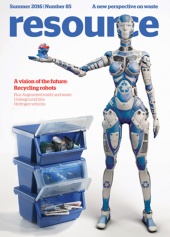Wonky veg: a distraction from the truth?
Following increasing pressure to cut down on food waste, some supermarket chains have launched specific discount lines for misshapen produce, which can only be a good thing – or can it? Farming industry insider Mark Palmer says that the practice could be wonkier than the veg…

There has been much coverage recently about wonky veg and how some retailers are now using more of the crop, encouraging consumers to buy imperfect fruit and vegetables. Having worked in farming, vegetable growing and packing for over 30 years, I think I can say it how it really is.
Figures supplied by many retailers do not show the levels of produce that is out-graded before it reaches the package, which finally reaches the shelf. Commonly, this is in the range of 20-40 per cent of that initially supplied. It would be unusual to get a 100 per cent pack, given a proportion will be totally inedible, due to rots, gross damage, or other defects, but even so, there is a significant loss due to artificial specification levels, which preclude perfectly good produce from being sold. For some crops, such as carrots, there are alternative uses for the off-grades, but not for other crops, due to short-life freshness (as for soft fruit), lack of other use, cost of transporting to other processing facilities, or volumes not matching demand of processors.
So, to try and promote their green values, some retailers have ‘developed’ so-called wonky veg lines, which can be bought at a lower price than main lines. This creates some problems. Firstly, the crops being used initially in these lines were actually already fairly well used in percentage terms. Nearly all carrot crops, for example, will be used through processing and the integrated nature of many packing/processing operations. Now, instead, packers are having more specifications imposed on them, and actually diverting product from mainline packs for use in ‘wonky’ packs. Also, I am hearing tales of retailer rejections because the veg is not ‘wonky’ enough. The whole system is mad!
Effects of wonky veg
It is common for growers not to be paid for the out-grade portion of the crop, so a potato grower will be paid for 85 per cent of whatever is delivered, as that is the figure that is commonly able to be packed from a pre-selected crop. So, if packers can get more from the crop, they get free produce, and if packers get less, the farmer gets a reduction in price. Wonky veg will come out of the ‘free’ portion of the crop. This results in lower sales for the farmer, as more of the crop is used, but at no extra return, with the packer getting free crop.
 This article was taken from Issue 85
This article was taken from Issue 85Moreover, as the specifications are artificial for premium, value and wonky veg (as all are from the same crop and same field, and grown in the same way), customers are being deceived into thinking wonky veg is saving waste. Some say it is a classic economist’s differentiation of the market, but in reality, it is a lie. For carrots, for example, retail ‘value’ ranges actually used to contain the wonky portion of the crop that could be used.
‘Wonky veg’ lines also actually devalue products that are actually exceptionally cheap, placing expectations that all veg is overpriced. When you speak to vegetable growers and they tell you they expect to make a profit one year in five, this gives some indication of the state of the industry.
A complex example
A UK sweetcorn packer last year was buying imported cobs in June, and paying for 85 per cent of the cobs delivered from Spain, as this is normal grade out. The packer decided to see how far it could push the out-grade and packed everything it had delivered, and waited for actual customer complaints (the retailer had no depot quality control checks). It achieved 99 per cent pack out of delivered cobs, customers were happy, with minimal complaints, and still the growers were paid on 85 per cent pack out! It was a win for waste minimisation, the environment and the packer, but a loss for the growers!
In reality, what retailers and packers should be doing is packing the crop as a whole, as then, the small percentage of ‘wonky veg’ will not even be noticed. 







